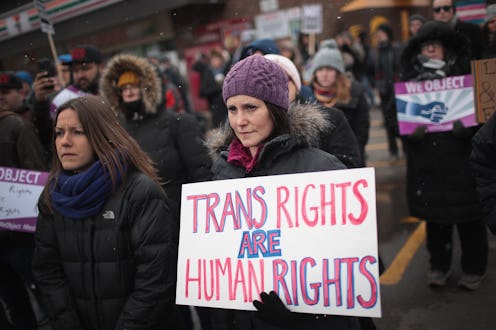News
Advocates For Trans Rights Are Stronger Than Trump

Last week, Donald Trump angered transgender rights activists when he removed protections for transgender students that the Obama administration had implemented in public schools nationwide. White House Press Secretary Sean Spicer argued that the change was for the sake of states' rights. But this justification hasn't done much to assuage worries of transgender activists, worried about the fates of students in public schools, who may be stopped from using the bathroom according to their gender identity and impede their ability to live a normal life.
However, for lawyers at advocacy groups that have fought for LGBTQ rights and continue to fight for trans rights now, Trump's actions are small skirmishes in the larger war for trans acceptance. Even as they face an administration that is battling against them, they still see the long fight ahead as one they can win.
"This letter that was issued does not in any way change the law. The law is what the law is," Demoya Gordon, an attorney for the Transgender Rights Project of Lambda Legal, a gay-rights focused law firm that joined with other advocacy groups in successfully arguing for marriage equality at the Supreme Court, tells Bustle. Gordon describes the administration's actions as "unfortunate and cruel," but nevertheless says, "the law protects transgender people from any kind of sex-based discrimination, and that continues to be the case."
Numerous court cases, from trial courts to federal appellate courts, have frequently ruled that federal protections against discrimination based on sex in Title IX and Title VII, as well as the equal protection clause of the Constitution, apply to transgender individuals. If school boards plan to take up the Trump administration's offer and stop trans students from using the bathroom of their choice, Lambda plans to sue, according to Gordon.
Already, seeing legal challenges to laws targeting transgender people are having success in the courts. On Monday, a federal judge in Pennsylvania ruled in favor of Lambda Legal, arguing on the side of Juliet Evancho, a transgender girl in the Pine-Richland School District who was denied access to the women's bathroom, and two other transgender plaintiffs, Elissa Ridenour and an individual only identified in the lawsuit as A.S. The case has gotten even more public attention from Evancho's sister Jackie, who sang at Trump's inauguration.
The most high profile case is that of Gavin Grimm, a transgender teenager who sued his school district over its refusal to allow him to use the boys' bathroom. A federal circuit court ruled in favor of Grimm. In a few weeks, Grimm faces the Supreme Court, which could potentially settle the question of whether transgender discrimination must be treated as gender discrimination countrywide. Advocates are hopeful about their chances, though they admit that the court is unpredictable, especially in its diminished 8-judge state.
“I am optimistic because I know that the law is on our side,” says Gordon.
But even if the Supreme Court doesn't rule to include transgender protections as a part of gender discrimination protections, activists see the fight ahead as one they are winning.
"When things change, people think it's slow and steady progress in a diagonal line straight up," David Stacy, the government affairs director of Human Rights Campaign, a pro-LGBT advocacy group, tells Bustle. "And that's not actually what really happens in the world. Change happens in fits and starts. You'll have a period of fairly rapid change, and then you'll have a period where things sort of slow down and those changes are consolidated."
Stacy points to the efforts to expand protections for transgender Americans at the state and local levels, even as the federal government has backed off it with this action. "I do see that progress on transgender rights has been very very quick," he says.
"We have progress in a lot of these areas. But sometimes we have setbacks. And so I see the trans guidance as a step backwards, but overall we continue to see progress with states and municipalities."
For example, he cites how 18 states and Washington D.C. currently have laws banning discrimination, with governors in four more having signed executive orders banning discrimination in state hiring. Nearly half the transgender community lives in one of these states. And Stacy pointed to the city of Jacksonville, Florida, where the city council expanded protections to transgender individuals less than a week before the Trump administration policy.
"We have progress in a lot of these areas. But sometimes we have setbacks. And so I see the trans guidance as a step backwards, but overall we continue to see progress with states and municipalities," says Stacy. He hopes that direct lobbying to Congress and state legislatures — similar to the town hall protests trying to stop representatives from gutting the Affordable Care Act — can cause elected officials to vote in favor of expanded protections.
"People need to raise their voices," says Gordon. "They need to make it clear that they do not support this, that this is unacceptable in a just and civil society."
The fight for trans rights doesn't just come from the federal government. It continues in the courts, as groups like Lambda Legal fight against discrimination through legal avenues; it continues in legislatures, as places like Jacksonville vote to expand protection; and most importantly for advocates, it comes in the culture, as people learn to be more accepting of transgender people into society.
"People need to raise their voices," says Gordon. "They need to make it clear that they do not support this, that this is unacceptable in a just and civil society."